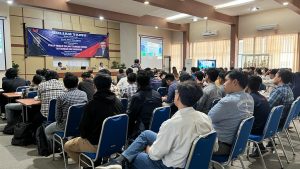Nuclear Potential and Challenges as a Future Energy Source
The energy transition program to achieve the national target of Net Zero Emissions in 2060 is being widely discussed. One of the main energy transition programs is replacing fossil fuel-based Steam Power Plants (PLTU).
It is hoped that the use of coal and diesel will be reduced by using more environmentally friendly electrical energy sources such as solar, wind, or geothermal energy.
Unfortunately, even though it can reduce carbon emissions, this energy source cannot fulfill the 3 basic principles of energy supply; guaranteed availability anywhere, anytime, and low cost. The consequence is that the production costs will be more expensive.
So many researchers are looking for alternative energy sources that can fulfill these 3 basic principles while also having low carbon emissions. Thorium is one reliable alternative proposed by some researchers.
This matter was discussed at the Industrial Lecture held by the Department of Mechanical Engineering, Faculty of Engineering, Universitas Brawijaya (FT UB) on Tuesday, 19 December 2023 in collaboration with PT. Thorcon Power Indonesia.
With the theme Nuclear Role in the Energy Transition: Challenges and Hopes, this activity was carried out in a hybrid manner with two Keynote Speakers; Bob S Effendi (Operation Director of PT Thorcon) and Prof. ING Wardana (Professor of Mechanical Engineering, FTUB) with moderator Ali Mundakir, former Managing Director of Pertamina Geothermal Energy (PGE).
Prof. Wardana conveyed the results of research related to the hydrogen production process as a fuel at an economical cost so that it is feasible to develop commercially.
Bob S Effendi then said that Thorium could be an alternative to produce affordable electricity and fulfill the three principles above. Thorium also has a high energy density so it is very suitable for accelerating the energy transition program at an acceptable cost.
“A guaranteed electricity supply at economical prices will spur investment and industrial growth, increase GDP, and increase economic growth,” explained Bob.
From the discussion that developed, Ali Mundakir concluded that there was still an unfavorable perception of the word nuclear being associated with Thorium. This is what needs to be straightened out so that Thorium as a source of electricity can be accepted.
 “Inevitably, Thorium will soon become a source of electrical energy and even become the future of providing electrical energy to encourage industrial improvement and the growth of the Indonesian economy,” concluded Ali Mundakir.
“Inevitably, Thorium will soon become a source of electrical energy and even become the future of providing electrical energy to encourage industrial improvement and the growth of the Indonesian economy,” concluded Ali Mundakir.
Considering the conditions above, Mechanical Engineering FTUB is ready to support the use of Thorium and seize the opportunities that exist both from a technical and non-technical perspective.
“As a superior campus, of course, Mechanical Engineering is very competent to contribute. In the future, discussions about the future of Thorium and Hydrogen will continue to be carried out on an ongoing basis,” emphasized Dr. Ir. Purnami, ST., MT., as Head of the UB Mechanical Engineering Department. (mic)

